Embark upon a culinary journey discovering time-honoured Moroccan recipes rooted in local Fez traditions and ingredients, at Fez Cooking School, found within the chic Palais Amani boutique riad hotel.
Fez is Morocco’s essential city destination, the spiritual and cultural heart of the Kingdom that is richly authentic, brimming with sensations that immerse you in the real Morocco, writes Andrew Forbes (The Luxury Editor).
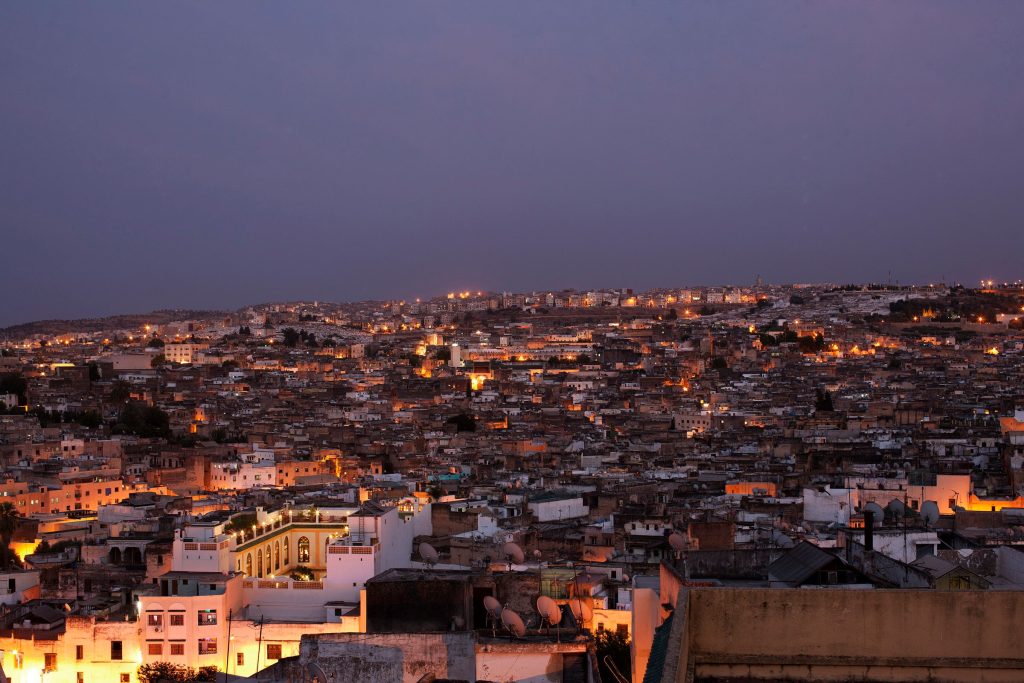

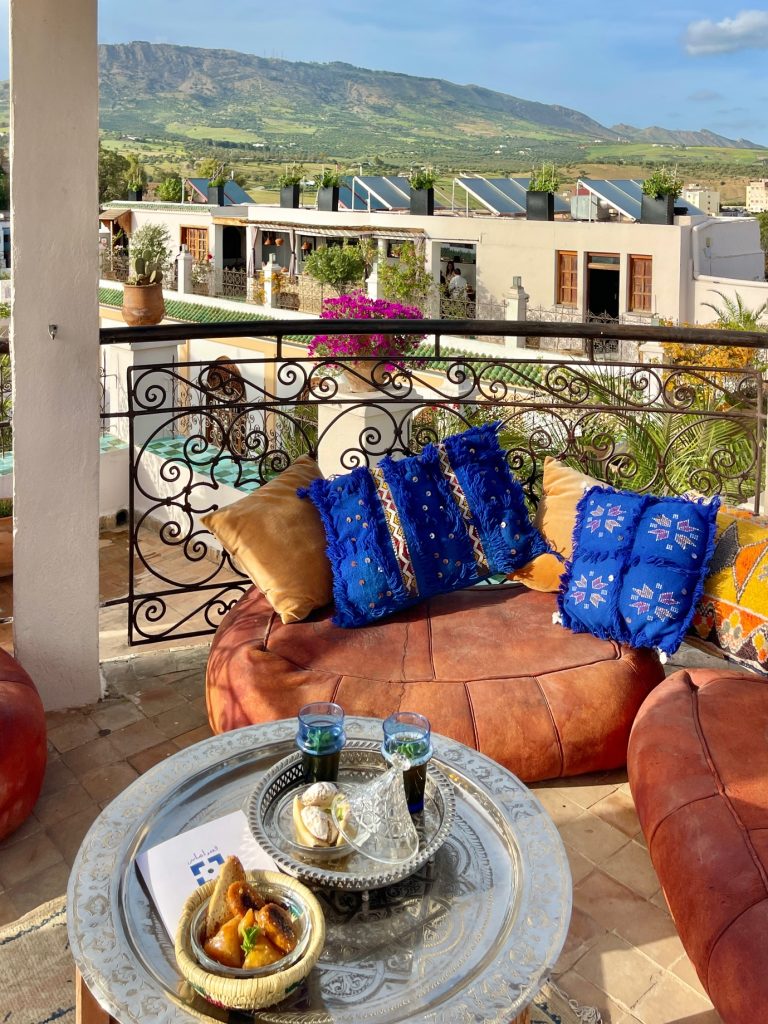
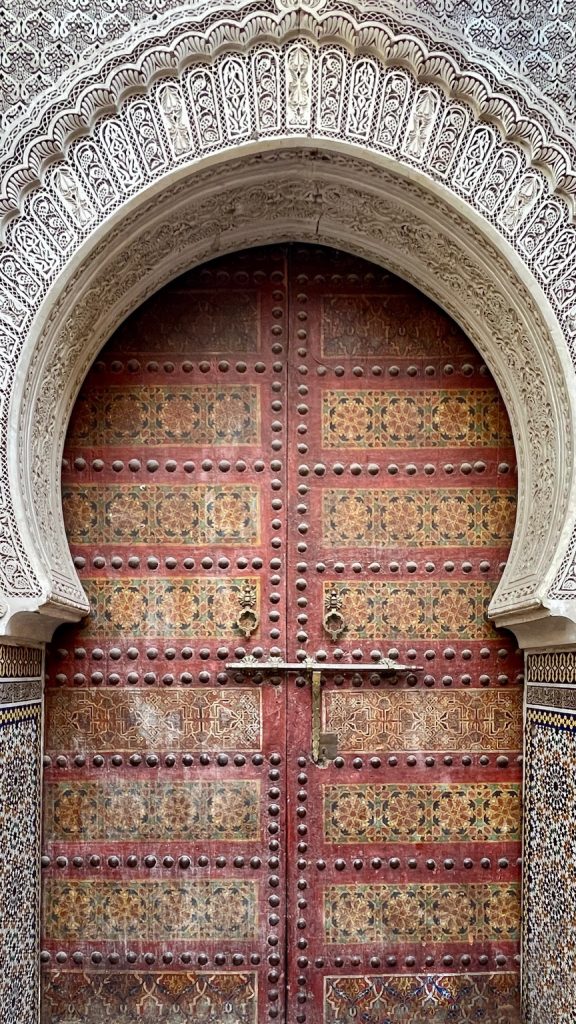
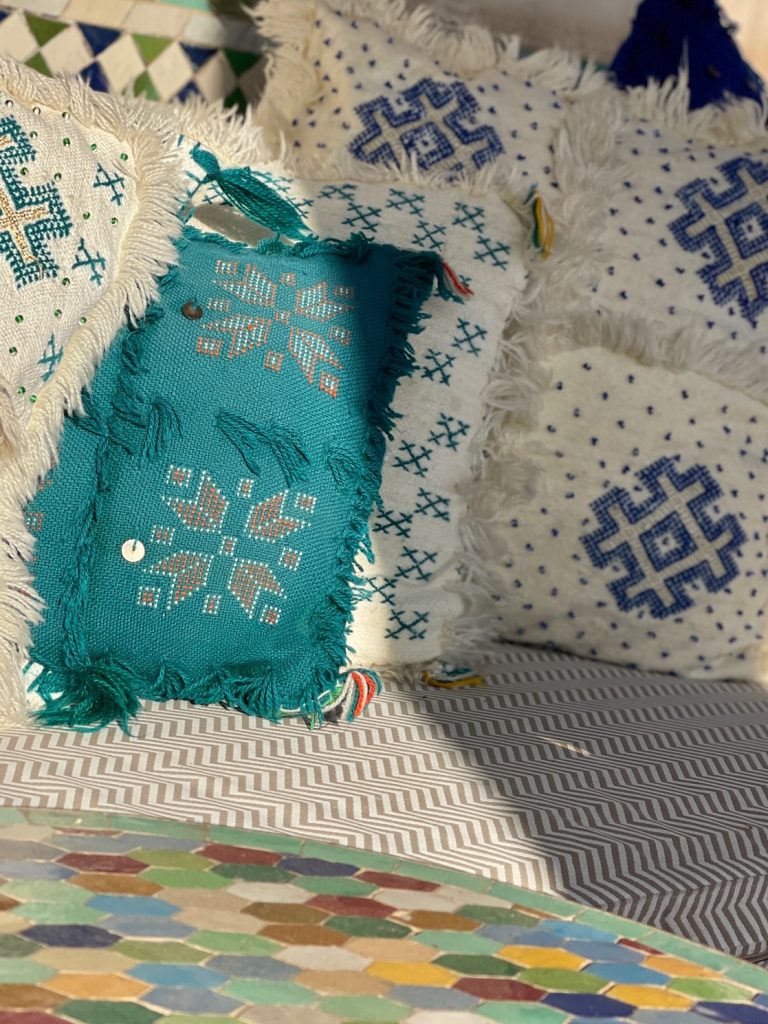
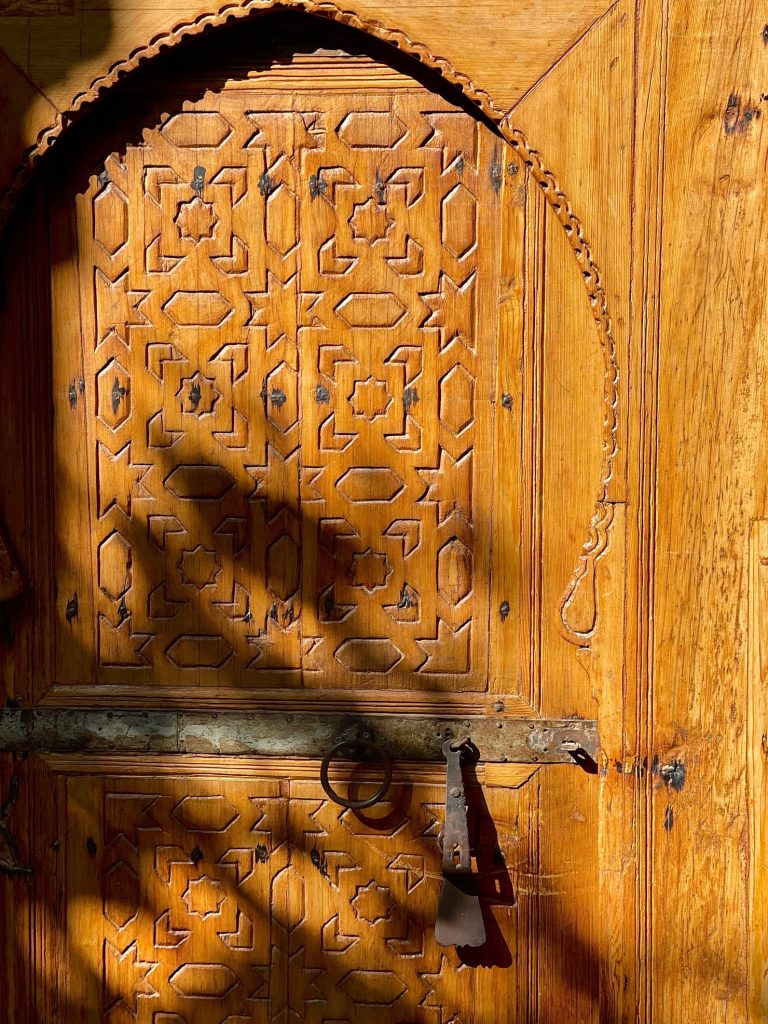
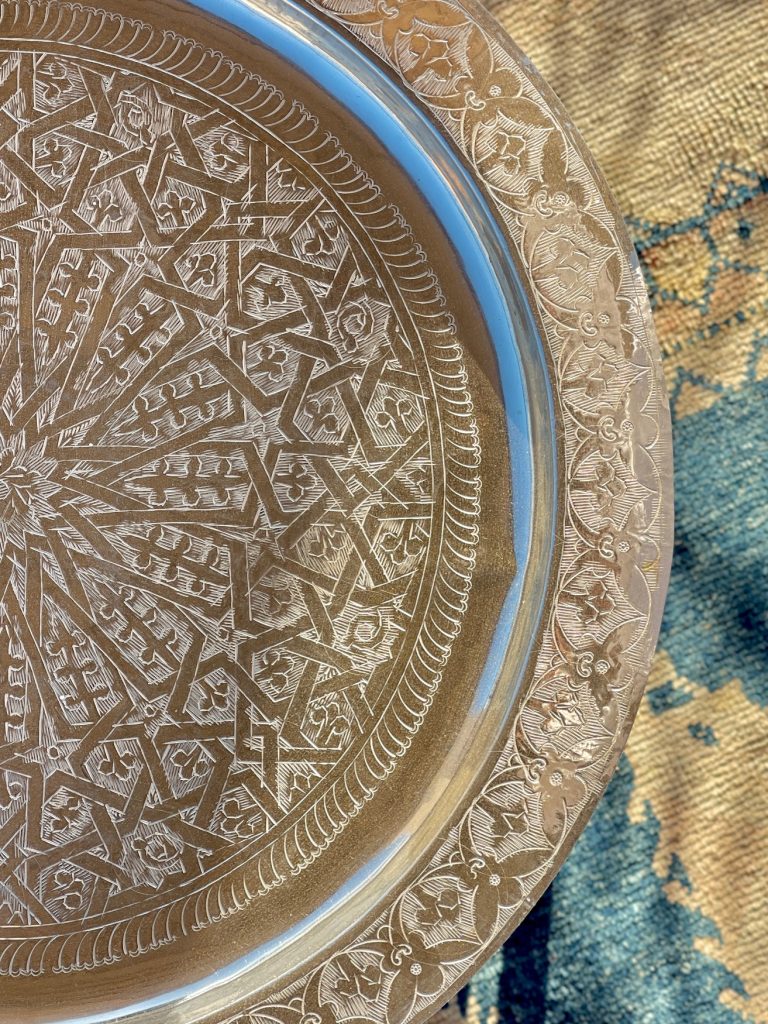
In recent years, Fez has carved out a reputation as a culinary destination, with the Fez Cooking School at Riad Palais Amani, leading the way in introducing visitors to the flavours, aromas, and textures of Morocco’s captivating gastronomy. My adventure began here at Riad Palais Amani, in the heart of the country’s oldest medina, Fès el-Bali’. This is vibrant ‘Old Fez’ and a UNESCO World Heritage site.
The property was purchased in 2006 by Jemima Mann-Baha and her Moroccan husband Abdelali who renovated it, creating Palais Amani, a relaxed, laid-back oasis in the ancient medina of Fez. Palais Amani is a deco riad was partly rebuilt in the 1930s and is well located close to the centre of this vibrant community, surrounded by streets that pulsate with the captivating activity of the traditional bazaars, souks, and artisan workshops.
Boutique Bliss
This comfortable riad is home to the Eden restaurant, as well as an authentic hammam, with massage treatment rooms. On the large rooftop, furnished with seating, sunbeds and terracotta pots of olive trees and flowering bougainvillaea, with compelling city and countryside views, is the renowned Fez Cooking School.
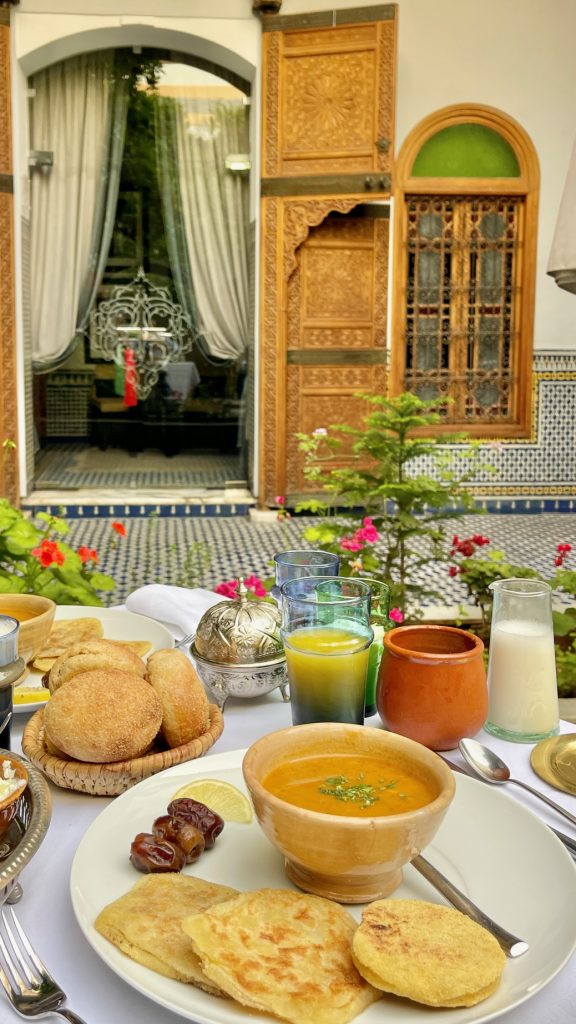
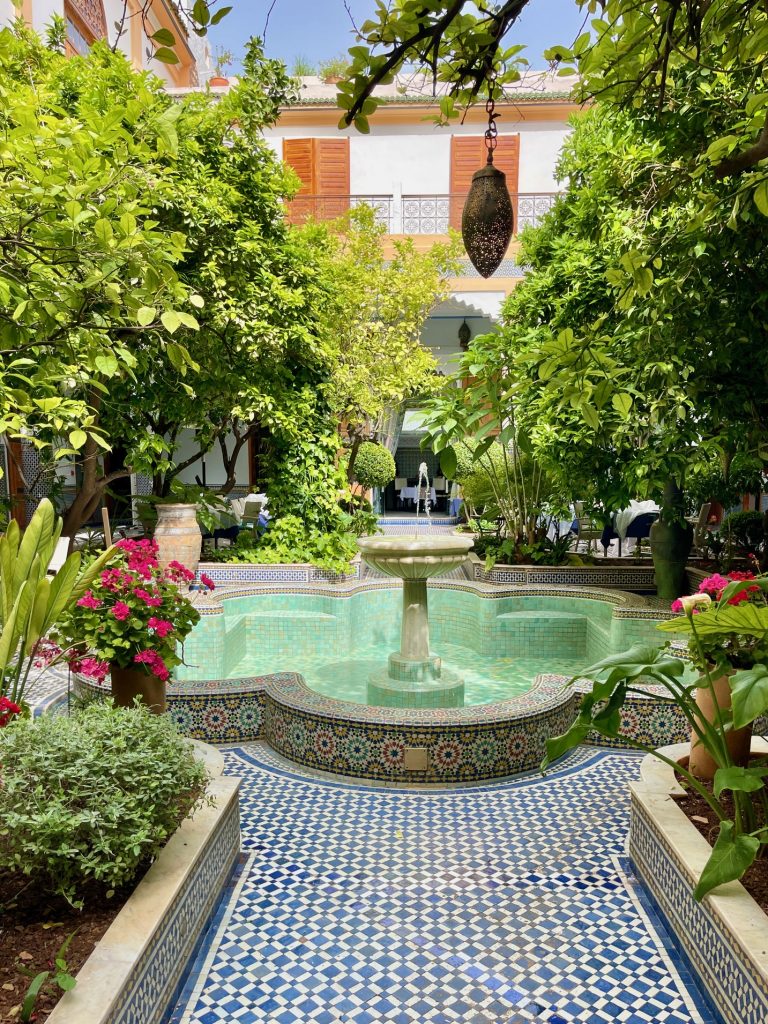
Once inside this 21-room riad, one is immersed in orange blossom fragranced world of tranquillity, where the noise of the exterior streets is replaced by the soundtrack of birdsong and a trinkling fountain. Guest rooms are distributed around this central garden, where you are greeted by Ba Mohammed, a long-serving member of the team who will prepare a restorative cup of local mint tea. Beside him sits the teapot, while at his feet are trays of indigo blue glasses and bunches of fresh mint, and cubes of sparkling sugar.
Dining tables are set in the shade of the citrus trees, from which hang intricately patterned lanterns, creating a compelling scene, an invitation for dinner at the raid’s Eden restaurant.

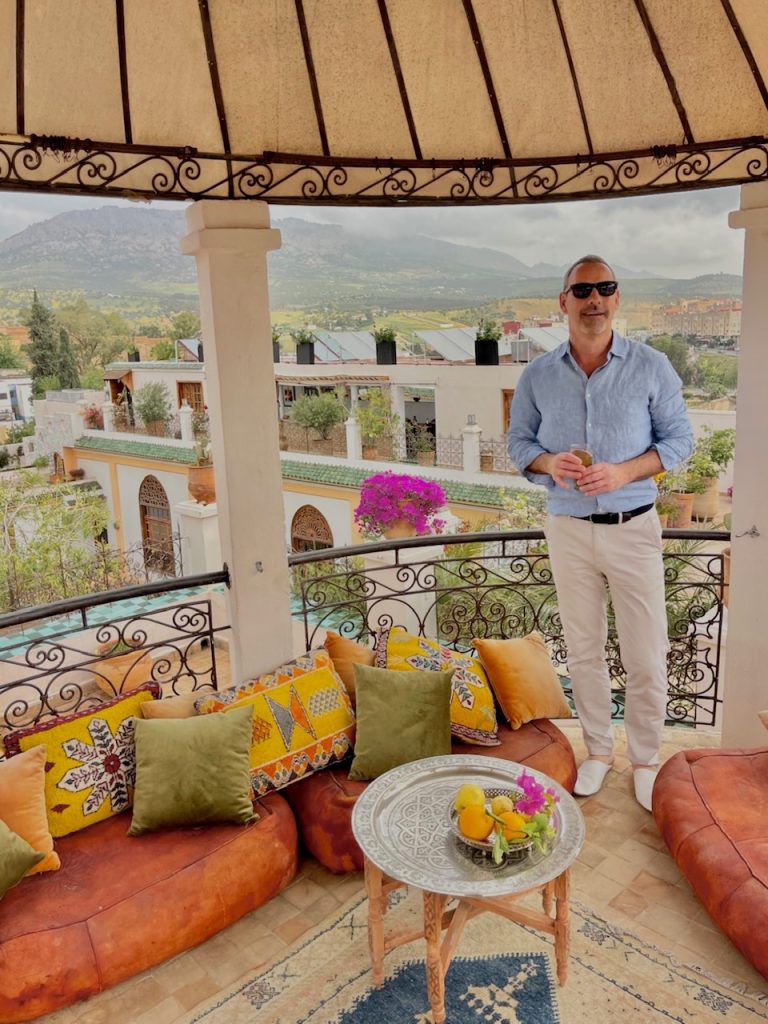



The riad’s rooftop is where you can enjoy a sundowner, accompanied by the sunset call to prayer echoing from the minarets, as swallows swoop and dive, and the warm evening breeze billows the terrace cabana curtains. The views are of old town rooftops, where TV antenna and satellite receivers convey modern influences in this protected old town of ancient architecture.
One side of the building’s rooftop is dedicated to the Fez Cooking School, open to guests and visitors, for daily classes that share the secrets of Moroccan cuisine, from richly textured Zaalouk aubergine salad to a classic chicken tajine, and a tempting Jawhara dessert.
Riad Suite
This riad follows the classic architectural style of high walls, without any windows facing outwards, offering unprecedented privacy to the interior courtyard of tiled walls enclosing a fragrant garden, with paths lined with flowing geraniums, a large central fountain, and mature trees alive with songbirds. This design dates back centuries, when the male owners wanted to keep their wives from the outside world, only allowing them to enjoy the inner garden, away from the sight of strangers. Today in these more progressive times, these noble Fez properties are being renovated and reimagined as family homes, restaurants, and boutique hotels.
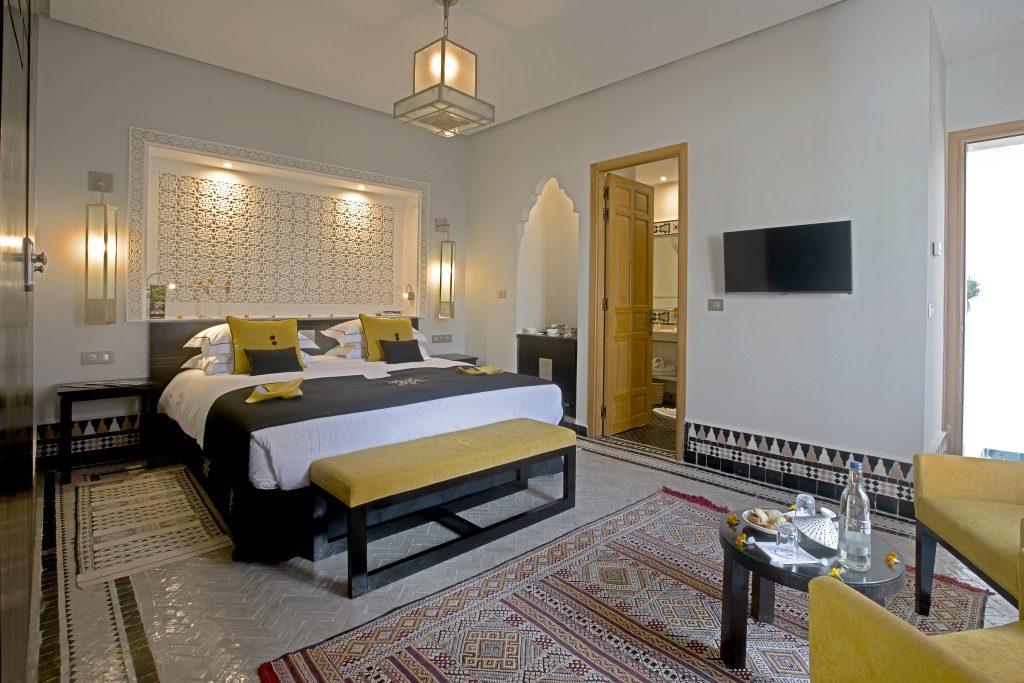
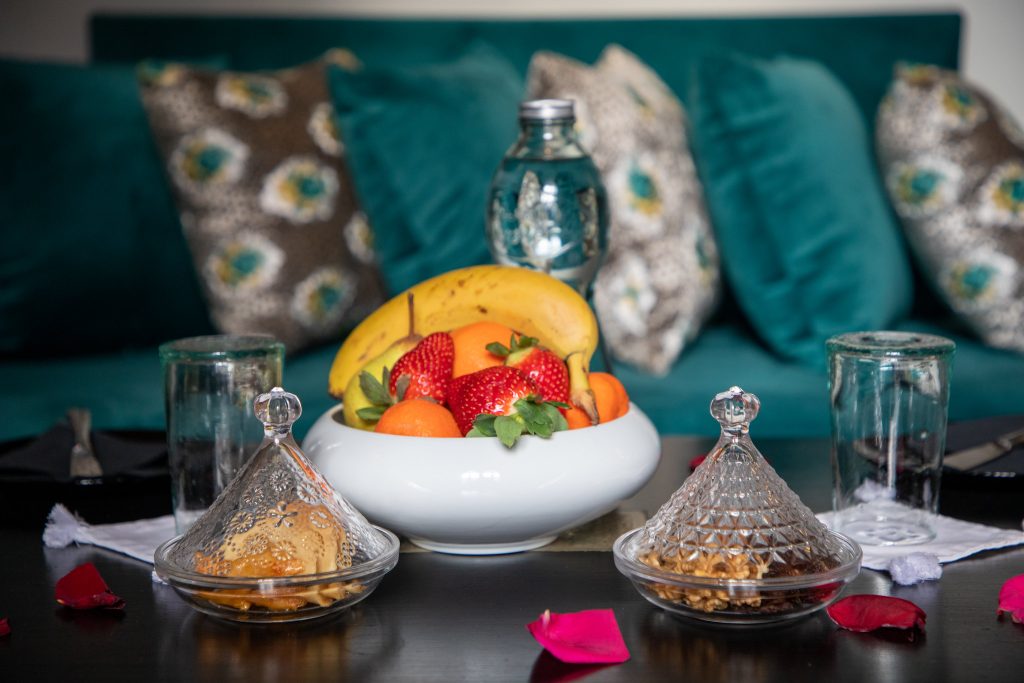
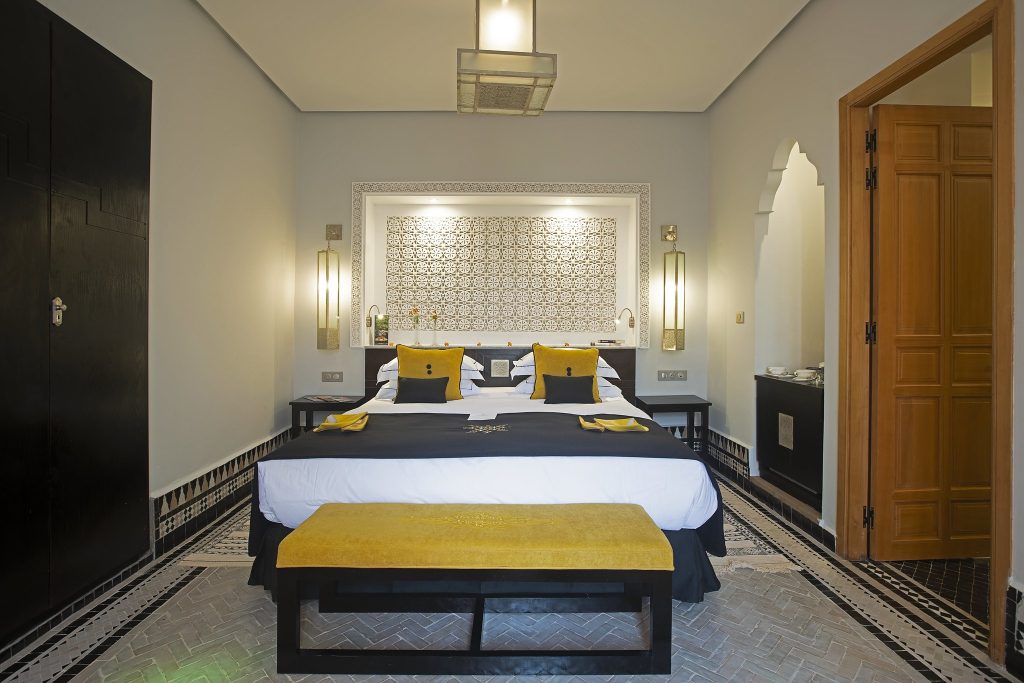

Our rooftop suite was evocative of an urban pied-à-terre, like a private apartment, with a separate bedroom, living room, dressing area, and large bathroom (with original features). Thoughtful details included complimentary artisan leather slippers that one could take home, as well as a selection of fruit and sweet Moroccan cakes. There was a mini-bar too, although we visited during Ramadan, and Fez as the spiritual capital of the nation, is quite conservative, with alcohol banned during this period, even for non-Muslim visitors. From our private suite apartment, we had stairs that climbed to a private roof terrace, where one could sit on crafted leather cushions, surrounded by decorative pillows, and sip mint tea, and lose yourself in the sounds of the city, as you gazed out over the rooftops towards the countryside, a patchwork of flowering meadows and rolling hills.
Fez is not only the epicentre of the Moroccan crafts industry, with world-renowned potteries circling the town, but also a food-lovers destination, where the streets filled with food stalls and carts laden with plump vegetables, vibrant fruits as well as the hole-in-the-wall shops selling the catch of the day and chickens soaked and plucked to order.
Food Tour
Helping me navigate this medieval world of narrow streets was Loubna El-Bouchikhi, the Experience Coordinator at Fez Cooking School. Together with Head Chef Houssam Laasiri we ventured deep into the medina, on a guided food tour, meeting the artisans, spice merchants, vegetable traders and meat vendors. We sourced the ingredients for our cooking class directly from the street vendors, sampling favours, testing ripeness and be allured by the bright colours and aromas of spices and dried herbs. We visited an olive vendor, his tiny store piled high will dishes almost overflowing with preserved fruit, from radiant green, to the darkest of shades. He offered us intense preserved lemons too, an essential ingredient for our tajine.


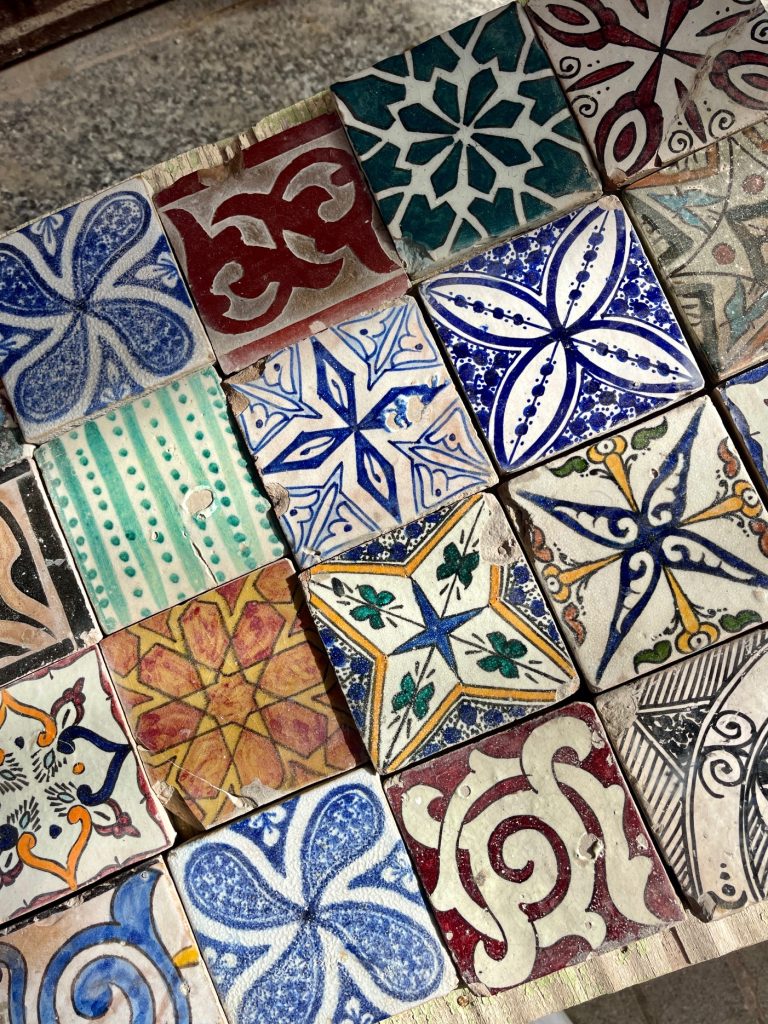
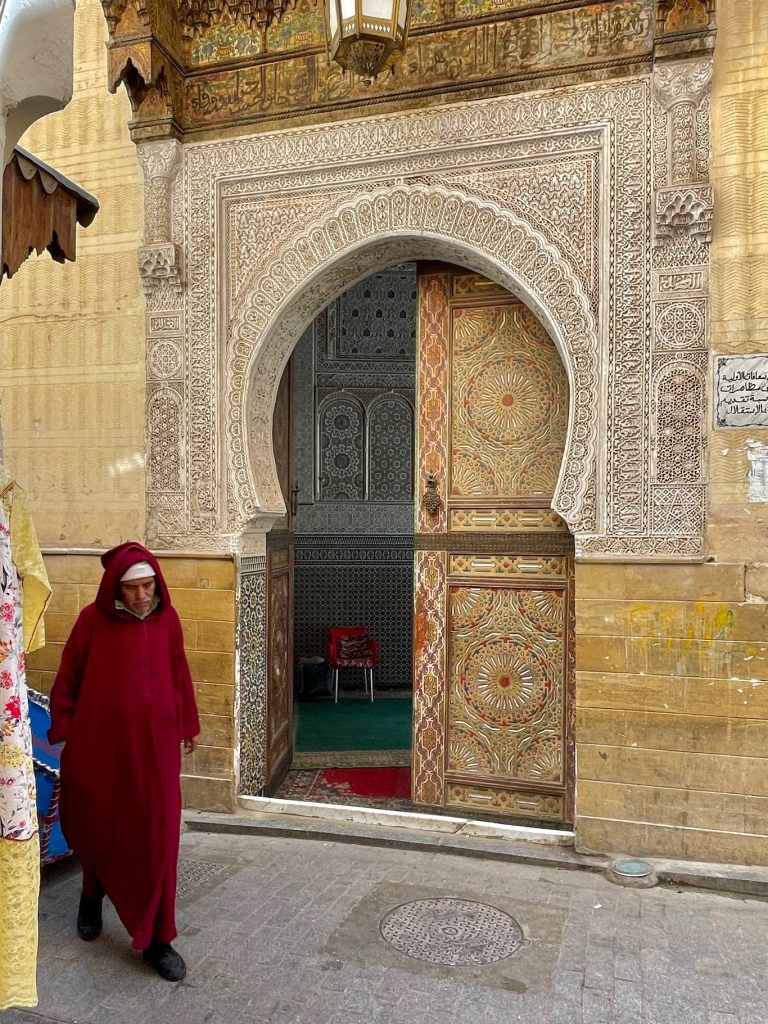

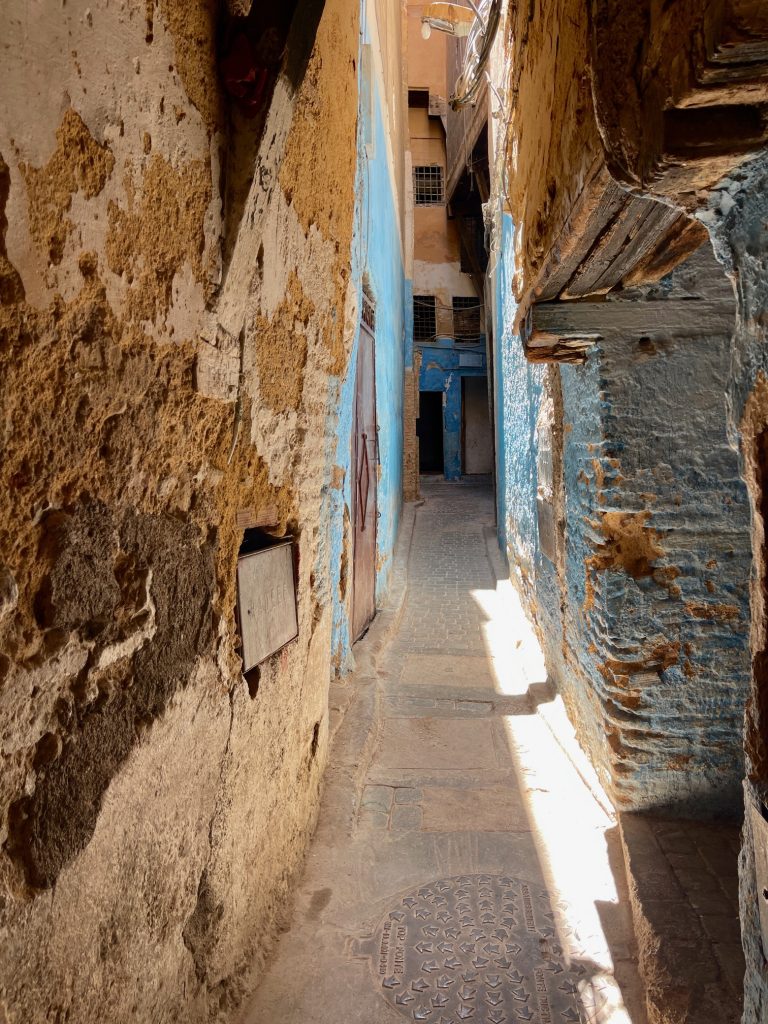

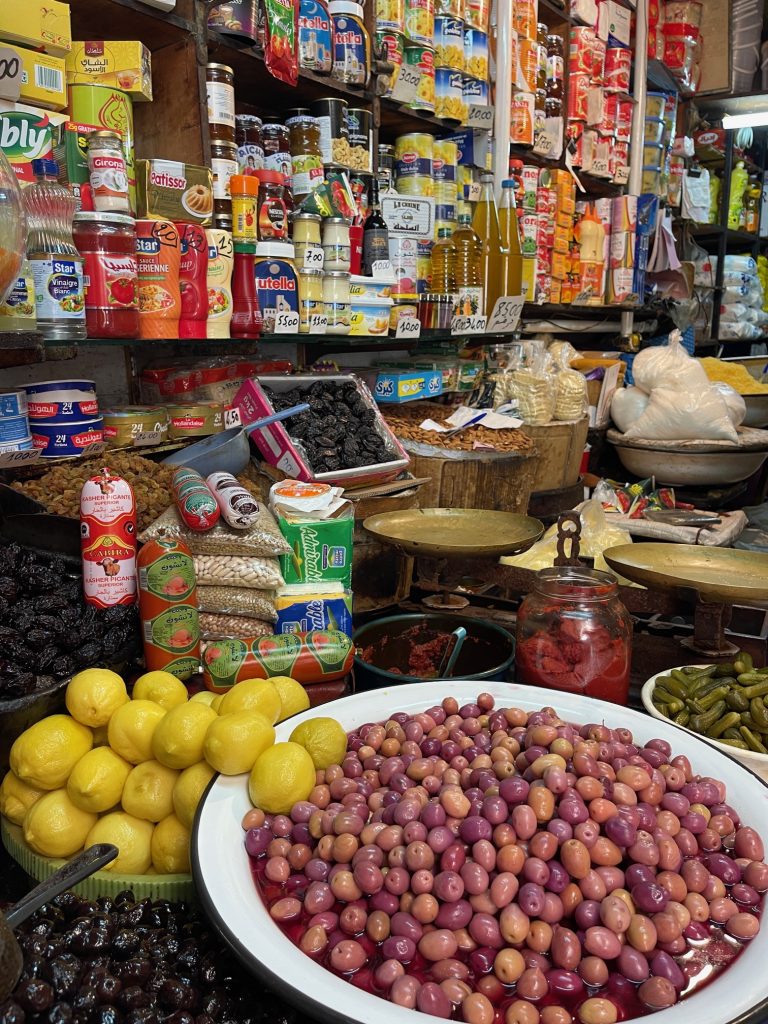


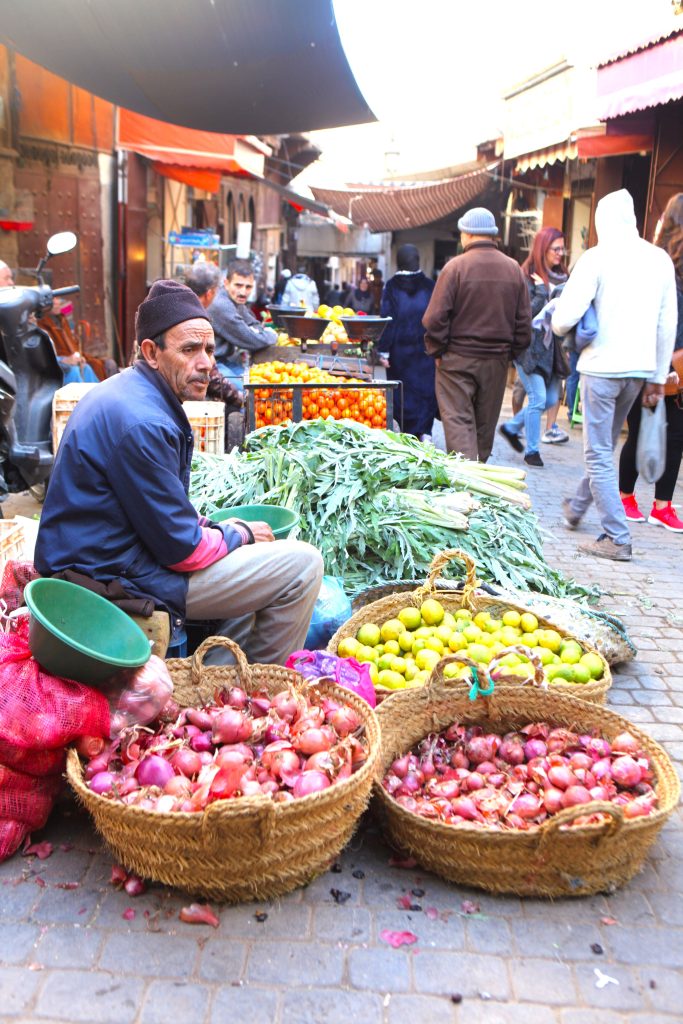

The tour took a little longer than expected, as I became distracted by stacks of emblematic beautiful blue and white Fez ceramics, die-cut wooden coasters, and a pharmacist selling ointments of prickly pear and argan oil, artisan cosmetics that promised to take years off me.
Shopping here becomes an unforgettable experience, treasured moments immersed in the magic of the old town, one of the oldest living medieval cities in the world. We took a break for a piping hot cup of mint tea, with the renowned Ba Abdullah, whose tiny teashop, hidden away on the first floor of a small house, secluded down a narrow street, has become famous for his proprietary tea, a secret mix of aromatic herbs including the usual peppermint and spearmint that is blended with sage, marjoram, wormwood, geranium, lemon verbena and a little citrus blossom.
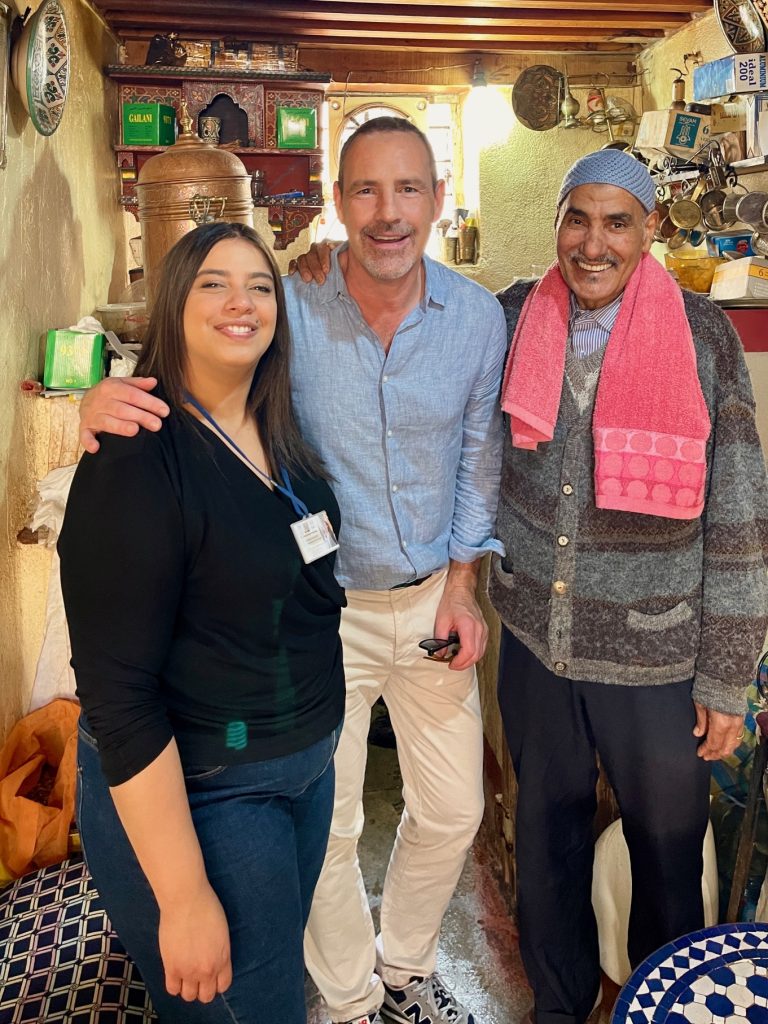

Like a alchemist, Abdullah brews the herbs in hot water from its copper tank, opening and closing the taps until he reaches the perfect strength. Then it’s poured into tall glasses, held in intricately patterned silver cup holders. It’s the ideal respite from the intensity of the streets below.
Once back at the riad, it’s time to don the iconic aprons of Fez Cooking School and learn the age-old cooking methods of Morocco, trying our hand at Fassi, Moroccan or Sephardic dishes. The atmosphere is fun, and friendly, as we wear our Fez hats.
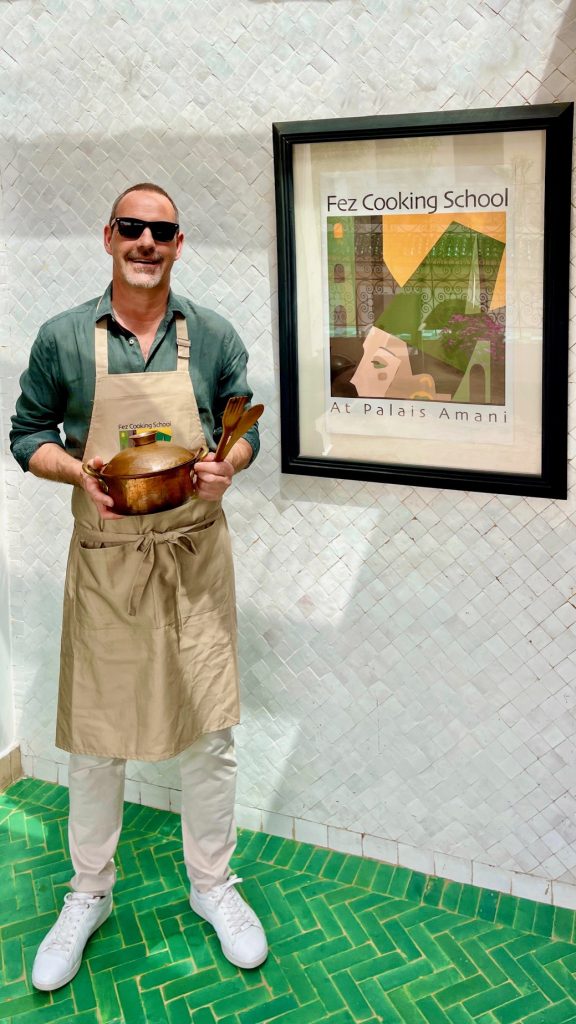
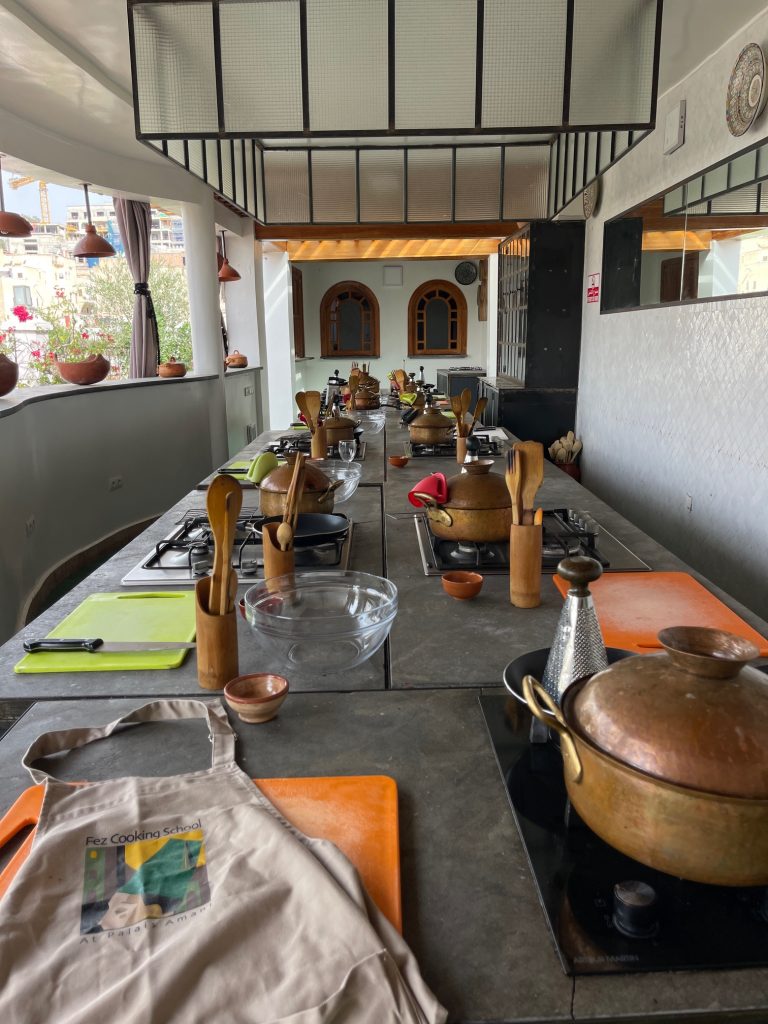
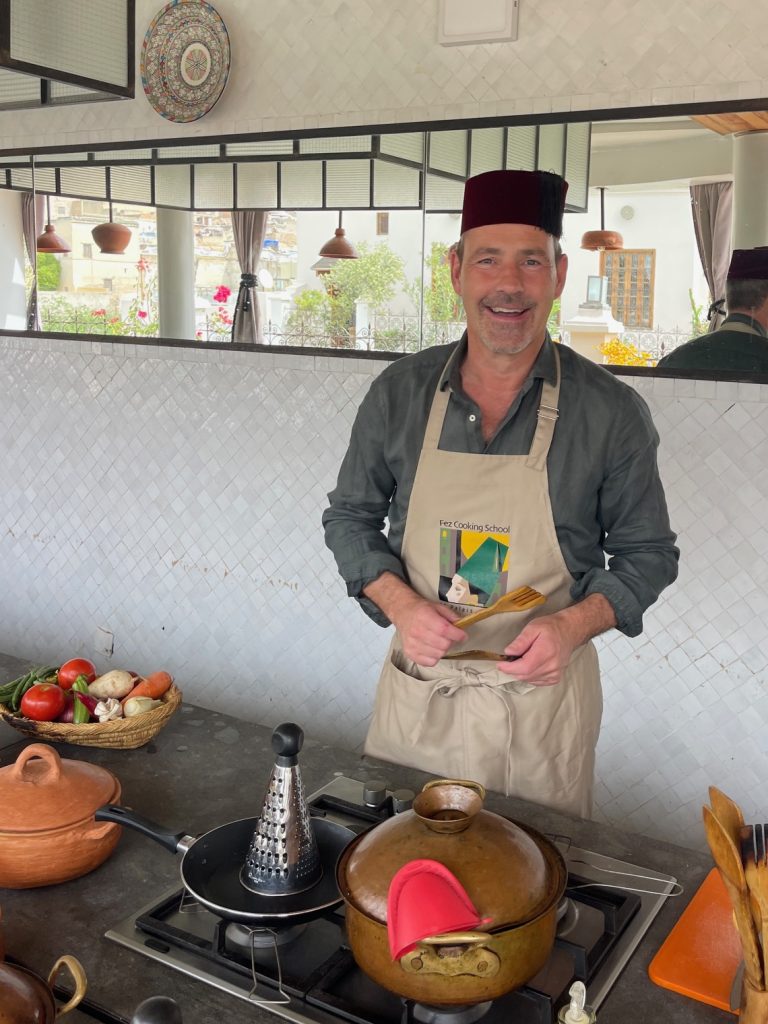
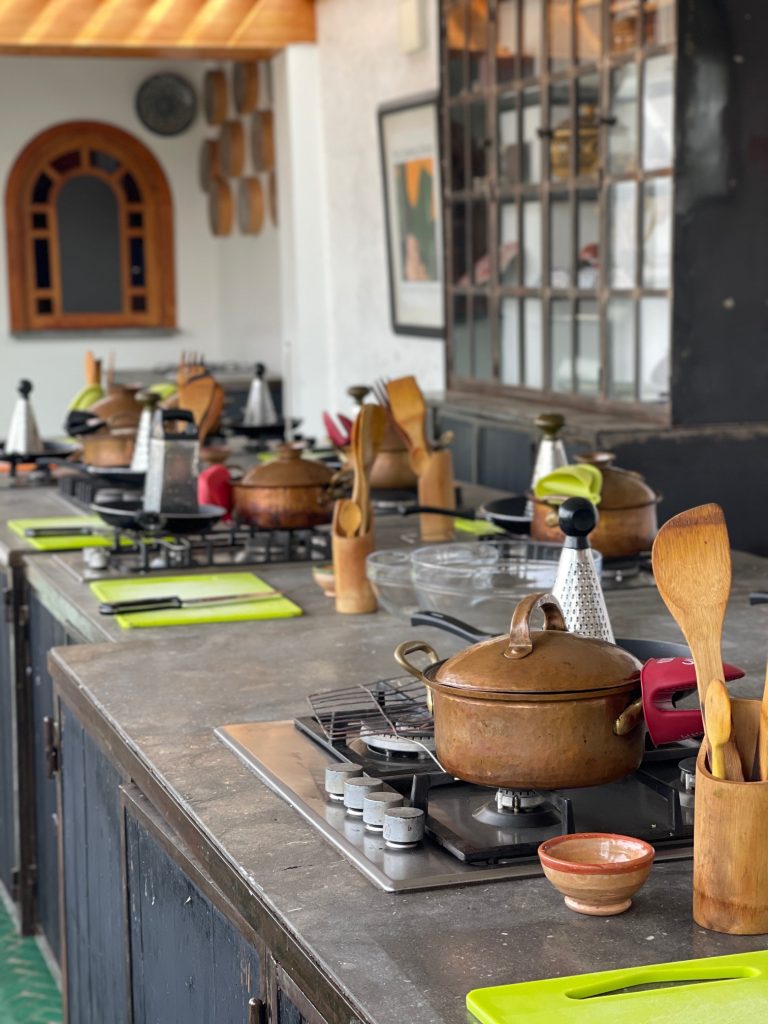

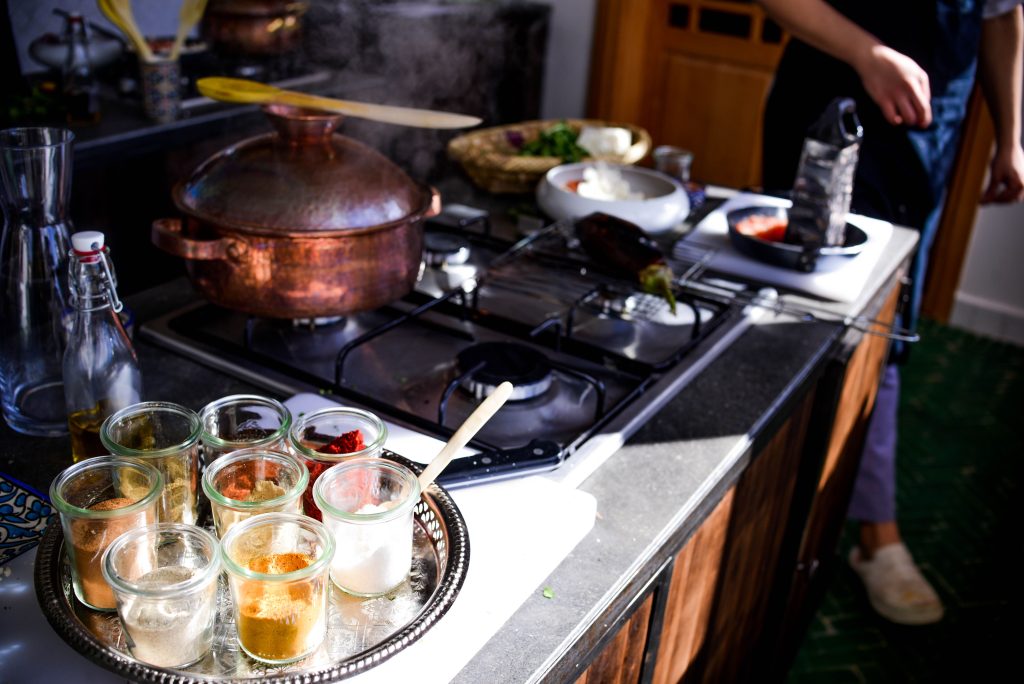
This is more than just learning to cook new recipes, it’s the kind of experience that enriches your stay, meeting new people from across the world who have come to Fez with open minds and hearts, eager for discovery.
I surprise myself as I work my way through the stages of each recipe, from roasting my aubergine to cooking my chicken tajine. The art is in the blend of spices for sure, and as a leaving gift from the class, we are each given a basket of spices to take home, including fragrant saffron, zesty ginger, smoky paprika, aromatic coriander, and earthy cumin. We get the inside track on how to make our own preserved lemons and are given a few tricks for authentic presentation.
The reward for our class is a 3-course lunch of the dishes we prepared including Zaalouk, a spicy tomato & aubergine cooked salad, with lots of garlic and spices; Demera, a rich and flavoursome chicken tajine, with garlic, onions, coriander, olive oil, and spices, and Jawhara – a milk custard pastilla pudding, with warqa pastry which we saw being freshly made in the medina then fried in oil in the kitchen and later layered with fruit and custard. Then we make our way down to the tranquil courtyard garden where our lunch table is already set, ready for us to devour our home-cooked Moroccan dishes.
Hamman Spa
Riad Palais Amani offers a restorative calm that embraces you and prepares you for your next adventure in the medina. Despite the temptation to stay in the hotel, pampered with a relaxing aromatic massage or rejuvenated with a bold hammam treatment, I recommend you explore Fez.
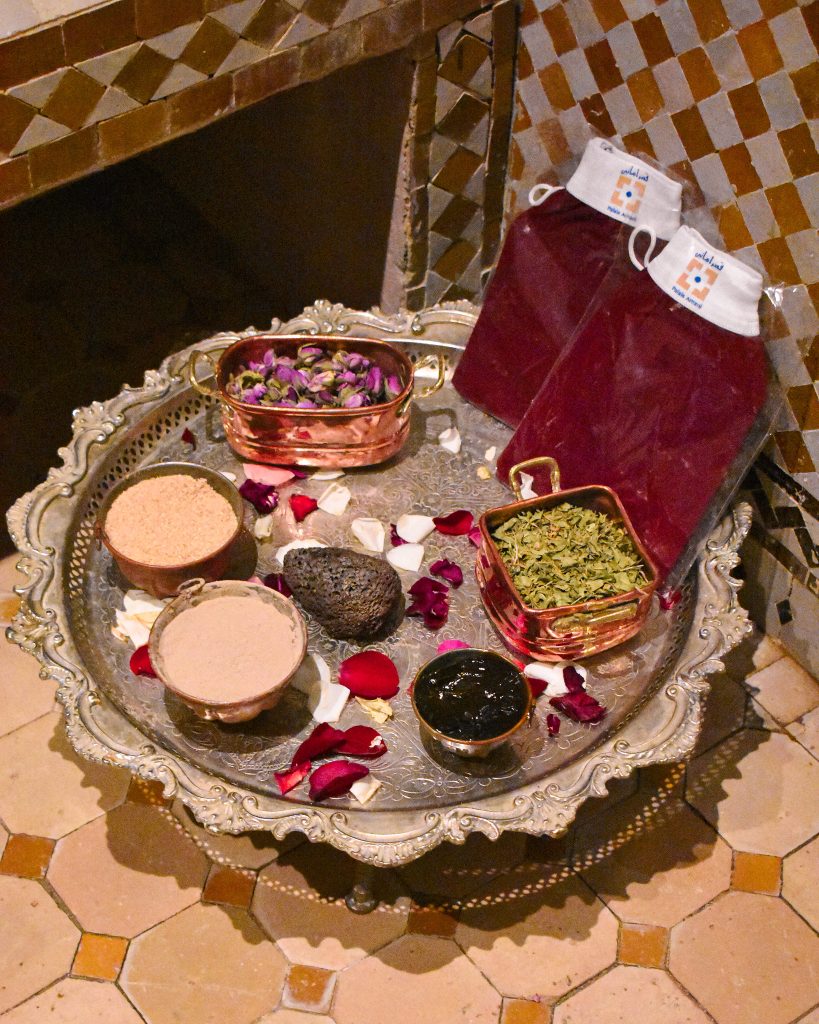
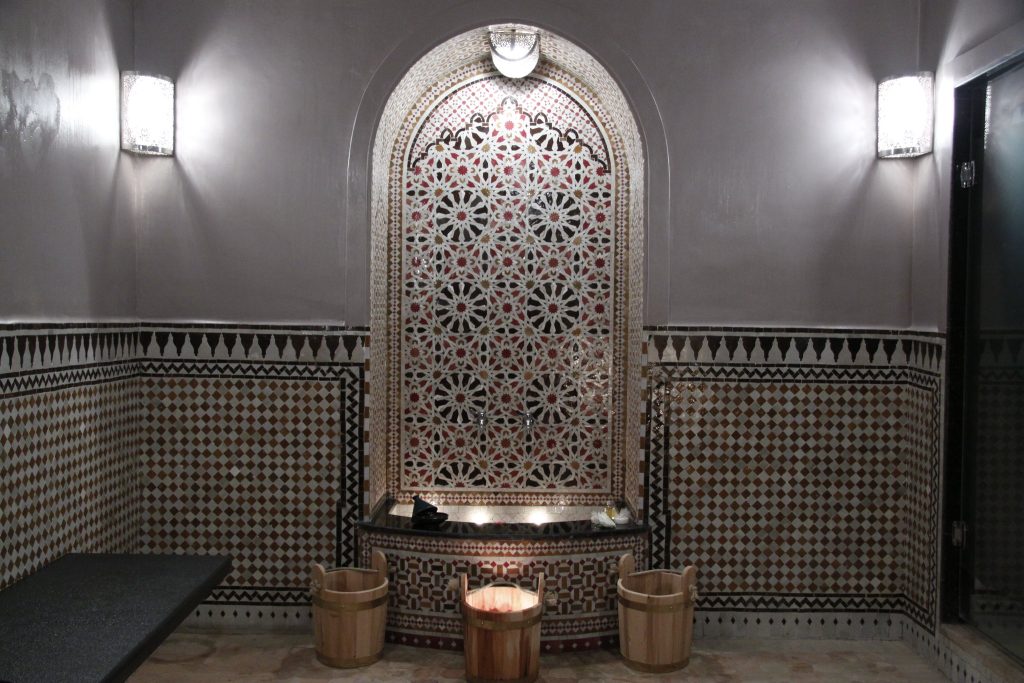
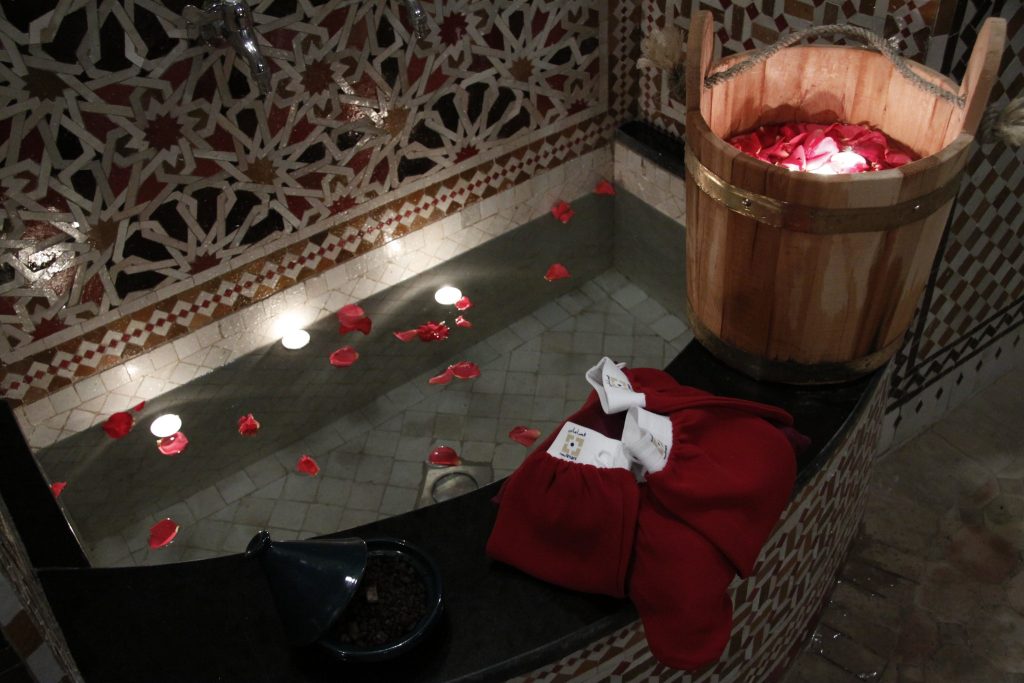
Iconic sights include the nearby Chaouwara Tanneries, dating to the 11th century. Admittedly the stench of the curing hides is a shock at first, but a guide will offer a piece of fresh mint to hold by your nose as you marvel at the workers, continuing centuries-old traditions. One of my other favourite destinations is the Nejjarine Museum of Wooden Arts & Crafts, with its beautifully restored courtyard.
The imperial architecture of the historic madrasas and merdesas is extraordinary. These religious colleges, which evolved as Fez emerged as a centre of education and spirituality, are essential sights to visit. The beautiful tiles, carved cedar wood ceilings, and carved stonework embody the artisanship of Morocco and ignite your imagination with tales of 1001 Arabian nights.
Discovering Fez
Before the heat of the day makes walking a task, I recommend you leave the medina, to discover the Jardin Jnan Sbil, the Bou Jeloud Gardens, on your way to ‘Fès el-Jdid,’ the second city. Known as New Fez, it’s relative, as this part of the sprawling city was said to be founded by the Marinids dynasty in the 13th century. Here the Mellah, the walled Jewish quarter, offers a distinct style, with multi-storey homes with large windows and carved wooden balconies facing outwards.
Finally, if you want to see how contemporary Fez lives, then take a Petit Taxi to ‘Ville Nouvelle,’ the modern commercial city of Fez begun by the French, and now a lively community with shopping centres, supermarkets, modern tea shops, restaurants, and designer stores.
Your reward for exploring is dinner at Eden Restaurant, at Palais Amani. Under the stars, the courtyard garden takes on a new dimension. Tree-hung lanterns offer subtle lighting, and the only sound is some classical jazz and the falling water of the fountain. The menu is traditional, beginning with choices of Moroccan salads, soups, and the most extraordinary Chicken Pastilla with almonds, undoubtedly one of the best I have enjoyed in Morocco over more than 20 years of coming here.
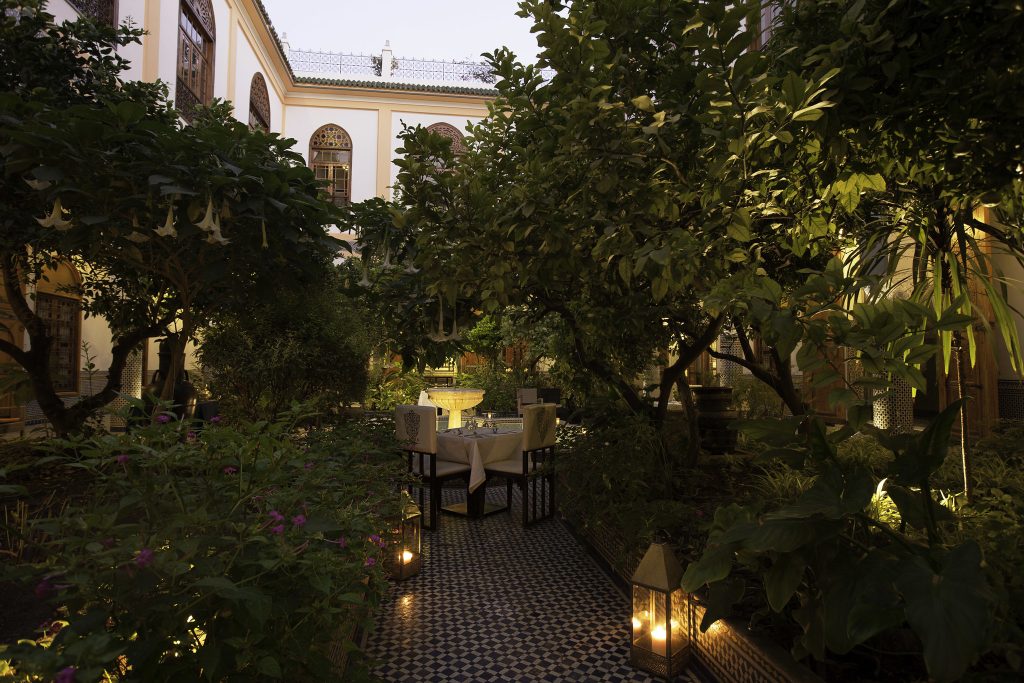
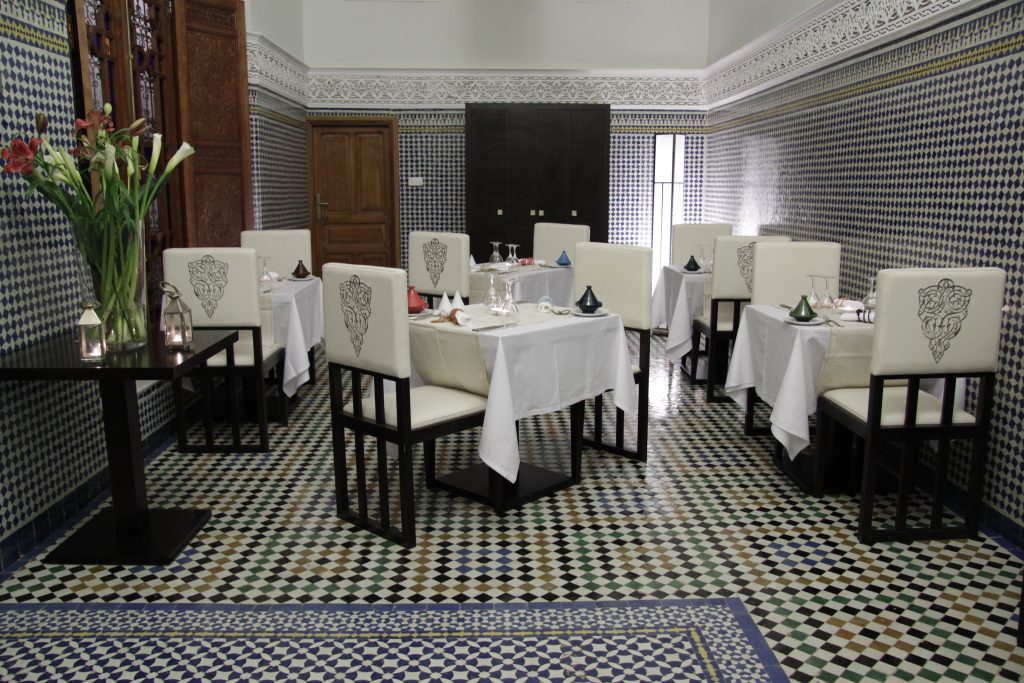
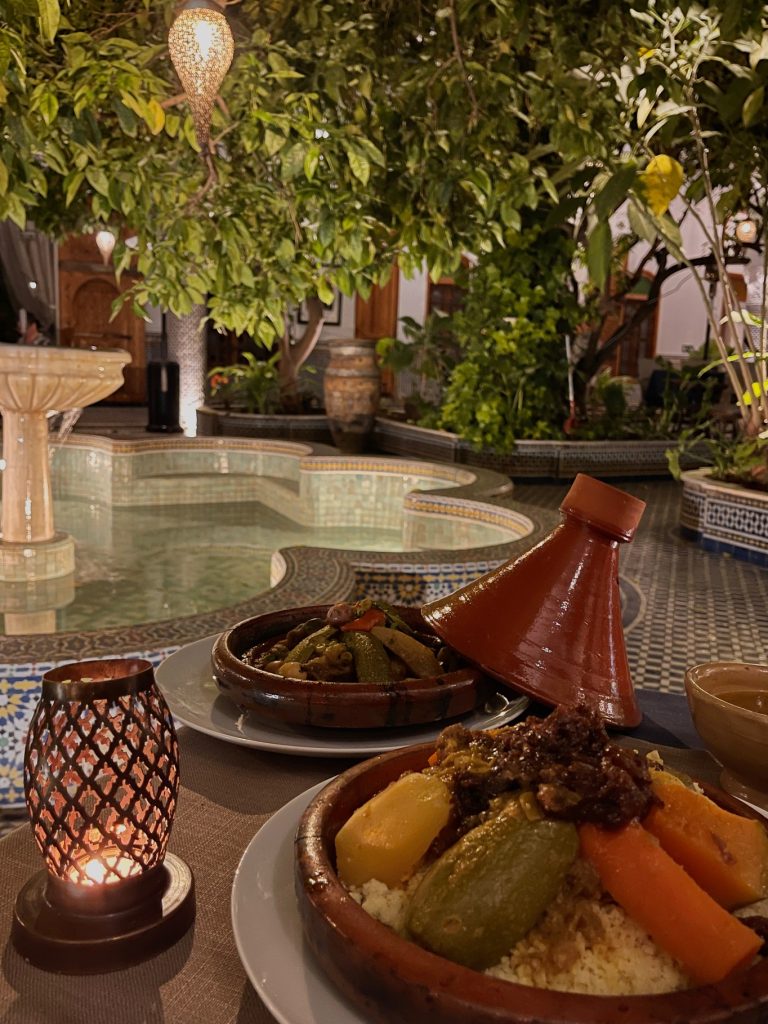



Tajines on the menu include chicken, beef, and fish as well as homemade couscous with vegetables or meat. There’s something so deliciously comforting about Moroccan cous cous, with his flavoursome stock, and rich caramelised onions that can never seem to be repeated in Europe.
Service is friendly and welcoming, conveying the laidback style of Palais Amani. Here elegance meets authentic hospitality, where you feel relaxed and very much at home.
This property is included in our guide to the best hotels in Fes
Contact Details
Website: www.palaisamani.com
Address: Palais Amani, 12 Derb El Miter, Oued Zhoune,30000 Fès, Morocco




